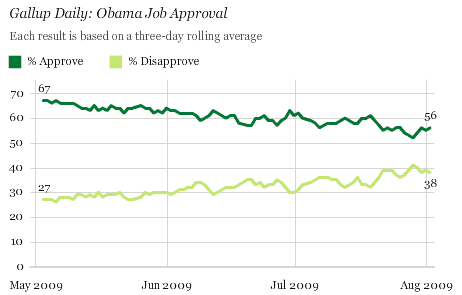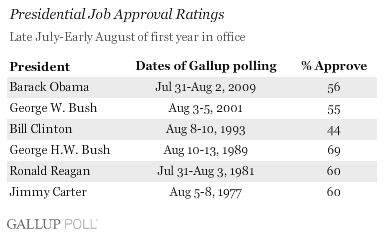PRINCETON, NJ -- President Barack Obama's job approval rating, after hitting his administration low point of 52% in the middle of last week, has edged back up, and is 56% for the latest three-day period, July 31-Aug. 2.

Gallup measures Obama's job approval rating on a daily basis, and reports three-day rolling averages consisting of approximately 1,500 interviews. Obama's three-day average was 61% as recently as July 17-19 but began to drop thereafter, reaching the aforementioned low point of 52% from July 27-29, Monday through Wednesday of last week. The high point for Obama was the 69% average that was measured in late January, just after he took office.
Obama's current 56% rating is about average for the job approval ratings of all presidents Gallup has measured since 1945, and is roughly equal to the approval rating of his immediate predecessor, George W. Bush, in early August 2001 -- Bush's first year in office. Comparisons of Obama's current standing to that of other recent presidents in the summer of their first year in office are mixed. Obama is well above where Bill Clinton was at about the same time in the summer of his first year, but he is at least a few points behind the positions of George H.W. Bush, Ronald Reagan, and Jimmy Carter at comparable times in their first year in the White House.

Obama has been prominent in news coverage of a number of different high-profile issues in recent days. Most visible has been Obama's full-court press on healthcare reform, in which he and his surrogates have taken every opportunity to make their case to the public -- actions that of course have been countered by strong reaction from Republicans and others who are opposed to the proposed massive changes in U.S. healthcare laws. Obama has also continued to address the nation's economic downturn and to tout the impact of his stimulus plan. He has been embroiled in controversy surrounding his public comments about the arrest of Harvard professor Henry Gates by the Cambridge, Mass., police. All of these are possible reasons for the decline in Obama's approval rating. Shifts in how these events are playing out to the public -- including the fact that the House Energy and Commerce Committee approved healthcare reform legislation, some more positive economic news, and Obama's "beer summit" with Gates and Cambridge police Sgt. Crowley on the White House lawn -- may help explain why his ratings have edged back up again.
The longer-term significance of the current uptick in Obama's ratings will not be known until it can be looked at in historical perspective. For those closely following day-to-day news cycles, however, the ups and downs in a president's job approval rating can be important indicators of the impact of various specific events on public support for the president. There has been a substantial amount of focus on Obama's job approval slide over the last week. The current data suggest that, at least for the moment, that slide has been arrested.
August will combine the usual downtime of a congressional recess and Obama's planned vacation (reportedly on Martha's Vineyard in Massachusetts) with continuing and active politicking on the healthcare reform issue on both sides of the debate. The impact -- if any -- of all of this on Obama's job approval rating remains to be seen.
Survey Methods
Results are based on telephone interviews with 1,591 national adults, aged 18 and older, conducted July 31-Aug. 2, 2009, as part of Gallup Poll Daily tracking. For results based on the total sample of national adults, one can say with 95% confidence that the maximum margin of sampling error is ±3 percentage points.
Interviews are conducted with respondents on land-line telephones (for respondents with a land-line telephone) and cellular phones (for respondents who are cell-phone only).
In addition to sampling error, question wording and practical difficulties in conducting surveys can introduce error or bias into the findings of public opinion polls.
